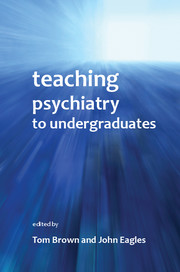Book contents
- Frontmatter
- Contents
- List of figures, tables and boxes
- List of contributors
- Preface
- Foreword
- 1 How do students learn?
- 2 Recent developments in undergraduate medical education
- 3 Undergraduate psychiatry teaching – the core curriculum
- 4 The organisation of undergraduate teaching
- 5 Assessment of undergraduates in psychiatry
- 6 Using computers to teach undergraduate psychiatry
- 7 How to give a lecture
- 8 How to do small-group teaching
- 9 Problem-based learning
- 10 Teaching trainee psychiatrists how to teach medical students: the Southampton model
- 11 Involving trainees in teaching
- 12 Involvement of service users in psychiatric education
- 13 Time-efficient clinical teaching
- 14 Intercalated degrees
- 15 Undergraduate experiences of psychiatry: a student view
- 16 Integration: teaching psychiatry with other specialties
- 17 Teaching the teachers in a cross-cultural setting: the Scotland–Malawi Mental Health Education Project
- 18 International undergraduate teaching
- 19 Teaching with simulated patients and role-play
- 20 Undergraduate medical education and recruitment to psychiatry
- 21 Choosing psychiatry: factors influencing career choice among foundation doctors in Scotland
- 22 Funding of the teaching of medical undergraduates
- 23 Dealing with students in difficulty
- 24 Training medical students to promote good mental health in secondary schools
- 25 Women in medicine
- Index
14 - Intercalated degrees
Published online by Cambridge University Press: 02 January 2018
- Frontmatter
- Contents
- List of figures, tables and boxes
- List of contributors
- Preface
- Foreword
- 1 How do students learn?
- 2 Recent developments in undergraduate medical education
- 3 Undergraduate psychiatry teaching – the core curriculum
- 4 The organisation of undergraduate teaching
- 5 Assessment of undergraduates in psychiatry
- 6 Using computers to teach undergraduate psychiatry
- 7 How to give a lecture
- 8 How to do small-group teaching
- 9 Problem-based learning
- 10 Teaching trainee psychiatrists how to teach medical students: the Southampton model
- 11 Involving trainees in teaching
- 12 Involvement of service users in psychiatric education
- 13 Time-efficient clinical teaching
- 14 Intercalated degrees
- 15 Undergraduate experiences of psychiatry: a student view
- 16 Integration: teaching psychiatry with other specialties
- 17 Teaching the teachers in a cross-cultural setting: the Scotland–Malawi Mental Health Education Project
- 18 International undergraduate teaching
- 19 Teaching with simulated patients and role-play
- 20 Undergraduate medical education and recruitment to psychiatry
- 21 Choosing psychiatry: factors influencing career choice among foundation doctors in Scotland
- 22 Funding of the teaching of medical undergraduates
- 23 Dealing with students in difficulty
- 24 Training medical students to promote good mental health in secondary schools
- 25 Women in medicine
- Index
Summary
Introduction
The option of taking an extra year to complete an intercalated degree, either classed as a BSc or BMedSc, has long been a tradition for students in UK medical schools. Recently, more students have chosen this option, reflecting the increase in medical student numbers and the increasingly competitive market for foundation-year posts. Currently, just over a third of all British medical students obtain an intercalated degree. Likewise, the range of courses on offer has increased. The proportion of students taking an intercalated degree still varies widely from school to school, and it should be noted that in some (e.g. Oxford, Cambridge and Nottingham) a BSc degree is either obligatory or given to all students. In most schools, however, intercalating is an option only for students who have performed well in other parts of the course.
Traditionally, intercalating was taken in between the preclinical and clinical years, with basic science subjects of anatomy, biochemistry and pathology being the norm. The history of medicine was one of the few alternatives on offer. With the introduction of integrated teaching and the increase in student numbers, a wider range of subjects, including those in clinical areas, have been offered, from aerospace physiology to human genetics. Now in most medical schools students are able to intercalate at any point in their undergraduate course after their second year. Medical schools also increasingly compete to attract external students.
The General Medical Council (2003) identified two main purposes for the intercalated year: the development of research skills and an indepth study in areas of particular interest over an extended period. This is reflected in the content of courses, where a strong research theme is a core feature. The second edition of Tomorrow's Doctors, published by the General Medical Council in 2003, and updated in 2009, also proposed that in the core medical degree (MB) course ‘factual information must be kept to the essential minimum that students need at this [undergraduate] stage of their medical education’. Thus, students are not able to study subjects in any great depth; medical students’ education must be spread thinly to cover all subjects needed to practise safely as doctors.
- Type
- Chapter
- Information
- Teaching Psychiatry to Undergraduates , pp. 162 - 172Publisher: Royal College of PsychiatristsPrint publication year: 2011



